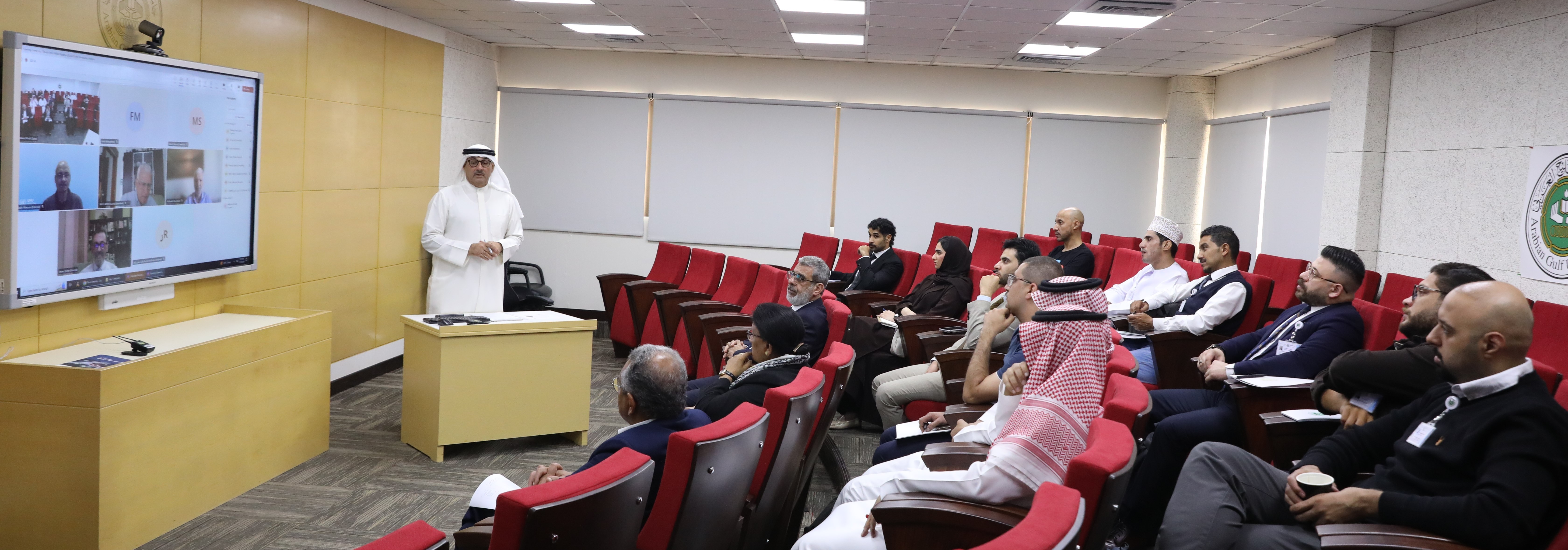
In the Presence of the UNU and the UNESCO Regional Office: The Arabian Gulf University Launches the 10th Edition of the UNU Diploma Programme in IWRM
Arabian Gulf University
17 Nov, 2024
The Arabian Gulf University (AGU) has launched the 10th edition of the United Nations University Diploma Programme in Integrated Water Resources Management, facilitated by the United Nations Water Learning Centre (UN WLC) for the Arab Region, which has been hosted by the university since 2008 under an agreement with its strategic partner, the United Nations University Institute for Water, Environment and Health (UNU-INWEH) in Canada. This initiative is supported by the Arab Fund for Economic and Social Development (AFESD) in the State of Kuwait, as part of the institute’s project to establish regional water centres across various parts of the world, aiming to enhance capacity and training in the field of integrated water resources management.
The inauguration ceremony featured remote attendance by Mr. Mansour Qadeer, Deputy Director of the UNU-INWEH, Dr Imam Bashar, Regional Hydrologist at the UNESCO Office in Cairo, alongside several university faculty members and professors from the Centre for Environmental and Biological Studies.
During the opening ceremony, Prof. Waleed Zubari, Dean of the College of Education, Administration and Technology, and Coordinator of the Diploma Programme, welcomed the participants of the programme’s 10th cohort, comprising 21 young men and women from various Arab countries, including the Kingdom of Bahrain, the Kingdom of Saudi Arabia, the State of Kuwait, Yemen, Sudan, Egypt, Palestine, Jordan and Syria.
During the ceremony, Prof. Zubari stated: “Water management is among the most critical issues facing the world today. In our Arab region, it poses an even greater challenge as most Arab countries are located in arid zones, leading to a scarcity of renewable water resources on one hand, and rapid population growth, which drives increasing water development demands on the other. To achieve a balance between these mounting water demands and the limited available resources, the scientific community in the water sector has agreed that water management must be approached holistically, considering not only the technical aspects but also the economic, social, and environmental dimensions. This underscores the importance of this programme for the Arab region.”
Prof. Zubari acknowledged the supporters of the 10th cohort of the programme, noting the AFESD’s provision of five generous scholarships for participants from the region's lower-income countries, the UNESCO Office in Cairo’s two scholarships for participants from the least developed nations, and the Supreme Council for the Environment’s five scholarships for specialists from the Kingdom of Bahrain. Additionally, the Kuwait Foundation for the Advancement of Sciences provided one scholarship to a specialist from Kuwait, as well as three participants from the General Authority for Irrigation in Saudi Arabia and three scholars from the Electricity and Water Authority in Bahrain.
“The United Nations University selected the Arabian Gulf University from among many institutions in the region to host this regional water education centre for the Arab region to offer a professional diploma in integrated water resources management, primarily due to its regional expertise and its strong educational and research background in water resource management. This is evident in its master’s programme related to resource management, completed master’s theses, and various research activities conducted by the university in different water and environmental fields, along with the university’s capabilities in information technology and its experience in distance learning. Since its establishment in 2008, the centre has graduated 9 cohorts, totalling 122 graduates.”
In the same context, he added: “The diploma programme is distinguished by its comprehensiveness, covering many aspects of technical, economic, social, environmental and political water management. It aims to build the capacity of professionals in the water sector and contribute to developing integrated administrative thinking on how to address various aspects of water resources and related issues in the Arab region. Participants are required to present graduation projects that reflect practical applications of integrated water resources management principles, addressing water challenges in their countries. Many of these projects serve as foundational or springboard references for outstanding reports submitted to employers.”
The programme features lectures by a selected group of experts specialising in various fields related to water management. Over the 10-month duration of the programme, these topics will be explored in depth, providing participants with the opportunity to enhance their knowledge and skills through interactions and learning from the expertise of the instructors, which include: Prof. Thamer Al Dawood, Prof. Mohammed Obeido, Prof. Ahmed Al Khouli, Dr Sabah Al Junaid, Dr Abdulhadi Abdulwahab, Prof. Ali Karnib, Dr Muhad Shamas, and Researcher Fadia Mohammed, the programme’s administrative assistant.
This training programme is designed to accommodate water professionals and specialists who cannot fully dedicate their time to studies due to work commitments. The study system is formulated as a dual system, which includes in-person attendance for short periods totalling four weeks and distance learning. The teaching methodology leverages self-study, assignment completion, and online discussions with instructors. Participants are required to submit a practical project and undertake a final examination, after which a diploma will be awarded.
